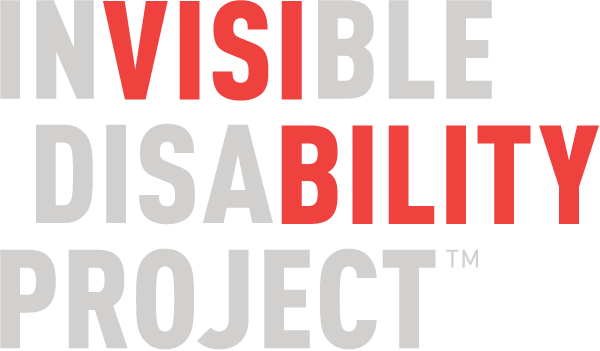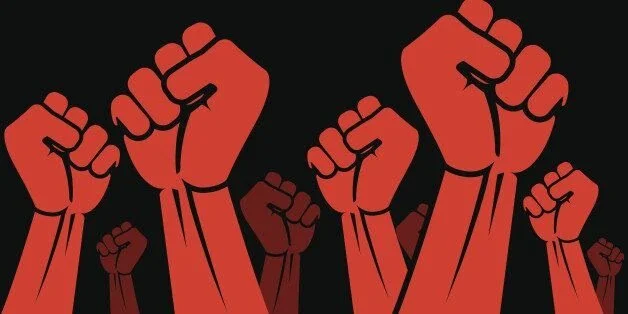Radical Disability Allyship, Mad Activism, and Black Mental Health
Power fists: Many dark red colored fists are rising up from the bottom of the image. The fists resemble the famous icon of the Black power fist. The background is black.
Radical Disability Allyship, Mad Activism, and Black Mental Health
By Boke Saisi
Mental unwellness, often termed mental ‘illness’ is an invisiblized disability that can be extremely distressing and disruptive to one’s quality of life. However, the insistence on categorizing this distress as an ‘illness’ does a number of things that are harmful to those experiencing it. While the terms ‘illness’ or ‘disorder’ may help to convey the severity of distress and aid in accessing needed accommodations and support, it undergirds at least three things: the creation of a normal/abnormal binary, upholding the presumed expertise of institutionalized psychiatry in ways that support Big Pharma, and strips human agency and places it at the hands of the state. The overlap of these points are particularly dangerous for Black people. Given the history of pathologization of Black peoples that marks us as irrationally inferior, and the ways that pathologization has and continues to be used to quell resistance to anti-Blackness, and to incarcerate, medically experiment on, and kill us, the use of these medicalized categories (i.e. ‘illness’ and ‘disorder’) maintain these violent and lethal anti-Black practices. Moreover, medical racism in all fields maintains that Black peoples and especially Black womxn’s pain are consistently dismissed. Psychiatry and psychology by no means are exempt from such dismissals. As such, I call for an anti-racist radical allyship that denaturalizes the medicalization of mental unwellness by centering the intimate relationship between anti-Black state violence, ableism/sanism, and institutionalized psychiatry.
I call for an anti-racist radical allyship that denaturalizes the medicalization of mental unwellness by centering the intimate relationship between anti-Black state violence, ableism/sanism, and institutionalized psychiatry. —Boke Saisi
Medical racism in what is known as the United States has been documented in historical and contemporary contexts. A plethora of examples includes the founding of gynecology in the 19th century that “practiced” invasive procedures on enslaved Black womxn--without anesthesia. The dehumanizing logic of enslavement positioned Black womxn and people more broadly, as more immune to pain. These violent assumptions are ever-present in the medical field today. Black womxn are consistently constructed as “strong” all while experiencing extreme neglect--to the point of death--by medical practitioners of all specialties. The ‘strong Black woman’ archetype is especially poignant as it relates to mental health. Experiences of racism in white supremacist societies already produce mental distress. Experiences of structural racism in medical settings only exacerbate this distress by functioning as both an additive stressor and a deterrent factor for receiving mental health care. On the flipside, institutionalized psychiatry has been notorious for pathologizing Black dissent to anti-Black racism. In the 19th century, the ‘diagnosis’ of drapetomania was created to pathologize enslaved people’s desire for freedom. Severe mental health diagnoses are contemporarily shown to be overly applied to Black people--particularly Black people gendered as men and children--and have been used to pathologize, criminalize, diagnose, and incarcerate those expressing justified anger and rage during Black liberation movements in the 20th century. The “angry Black woman” stereotype serves as a contemporary example of the denial of white supremacy and the racist and sexist perceived irrationality of Black womxn. Additionally, the relationship between institutionalized psychiatry and the medical oppression of queer identity, non-normative gender expression, and women’s autonomy highlights how harmful the reliance on psychiatry is when anti-Black racism is compounded with homophobia, transphobia, and sexism. The constructs of normality and abnormality have long been upheld by psychiatric labelling.
Critical disability activism and scholarship has outlined how the construction of normal/abnormal binaries are upheld to the detriment of disabled people’s lives. In the context of invisiblized disabilities, the term ‘neurodiversity’ has come to participate in disrupting the aforementioned binary. However, when speaking about mental unwellness, an emphasis on neurology still upholds the idea of mental distress as inherently biological and in the brain. A mad activist framework troubles any emphasis on biological determinism and the false binary between the body and the mind. Additionally, oppressive social structures are shown to be just as influential to one’s mental distress as any experience of physiological distress under this framework. In a white supremacist and anti-Black state such as what is now known as the United States, experiences of structural racism such as unequal access to adequate healthcare, practices of incarceration, and housing discrimination produce distress. To medicalize this distress is to look to the white, heterosexist institution of psychiatry as a solution thereby allowing it to create a diagnosis and an attendant medication prescription. In other words, under this logic, the “cure” to racism can now come in the form of a pill. Pharmaceutical corporations are profiting off of this fallacious idea. Disrupting this logic through denaturalizing the idea of mental ‘illness’ and ‘disorder’ is an act of anti-racist and anti-capitalist radical allyship.
State reliance on institutionalized psychiatry to alleviate socially produced distress is harmful and often lethal for Black people. More than half of all police murders of Black people are in response to a mental health crisis. Additionally, Black incarceration--as a continuum of genocidal enslavement practices--overlap with institutionalized psychiatry in a number of ways. Firstly, involuntary “treatment” is enforced through the criminal injustice system that utilizes the police to adhere to state-mandated psychiatric incarceration. Secondly, incarceration itself produces and exacerbates mental unwellness. This is widely researched and reported yet arrest and incarceration continues to be used as a response to mental unwellness in which upwards of seventy percent of those incarcerated may experience severe mental distress. Thirdly, the relationship between anti-Black racism, incarceration, forced medication, and medical experimentation is made evident through numerous documented histories chronicled by many including prison abolitionist Angela Davis and her experience of incarceration. In this way, the medicalization of mental unwellness for Black people often equates to a complete stripping of bodily autonomy under the auspices of psychiatric medical care. Again, radical anti-racist disability allyship requires a rejection of mental unwellness framed as ‘illness’ or ‘disorder’ because of the way anti-Black state institutions use these categories to mete out physical, psychic, and lethal violence on Black people. The pertinent role that oppressive social structures play in producing experiences of mental unwellness for Black folks is at the center of an anti-racist critique of the state and its relationship to Black mental health. Radical disability allyship that centers this fact creates the possibility of disrupting the violence produced by this white supremacist heteropatriarchal state. After all, if racist, capitalist, and heteropatriarchal structures and institutions of violence were abolished, would medicalized mental health diagnosis hold the same weight?
Boke Saisi
Boke Saisi is a Ph.D. Candidate in Ethnic Studies with a Graduate Specialization in Critical Gender Studies at UCSD. She previously graduated with an MA in Ethnic Studies from UCSD, an MA in Communication and Culture from York University in Toronto, Canada and a Bachelor of Journalism from Ryerson University in Toronto, Canada. Her research and writing interests include Black feminist thought, Indigenous, and decolonial feminisms, critical gender studies, mad studies, critical disability studies, carceral studies, media studies, and political economy
Image Description: A young Black woman stands wearing a black sweater. She is wearing large glasses and has short, reddish hair. Behind her is a bookcase with books. The woman has her arms crossed and she is staring at the center of the photo, looking confident.


